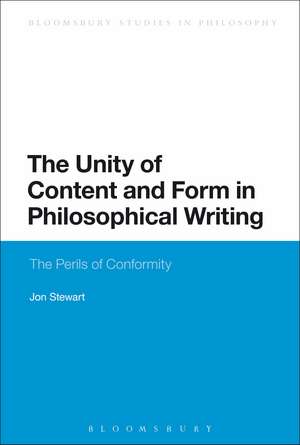The Unity of Content and Form in Philosophical Writing: The Perils of Conformity: Bloomsbury Studies in Philosophy
Autor Professor Jon Stewarten Limba Engleză Hardback – 17 iul 2013
Din seria Bloomsbury Studies in Philosophy
- 13%
 Preț: 257.50 lei
Preț: 257.50 lei - 13%
 Preț: 256.77 lei
Preț: 256.77 lei - 22%
 Preț: 256.20 lei
Preț: 256.20 lei - 22%
 Preț: 257.03 lei
Preț: 257.03 lei - 13%
 Preț: 255.47 lei
Preț: 255.47 lei - 22%
 Preț: 237.28 lei
Preț: 237.28 lei - 22%
 Preț: 257.50 lei
Preț: 257.50 lei - 13%
 Preț: 256.20 lei
Preț: 256.20 lei - 22%
 Preț: 258.89 lei
Preț: 258.89 lei - 13%
 Preț: 255.11 lei
Preț: 255.11 lei -
 Preț: 256.20 lei
Preț: 256.20 lei - 22%
 Preț: 772.58 lei
Preț: 772.58 lei - 22%
 Preț: 240.50 lei
Preț: 240.50 lei - 22%
 Preț: 257.03 lei
Preț: 257.03 lei - 23%
 Preț: 255.84 lei
Preț: 255.84 lei - 23%
 Preț: 255.29 lei
Preț: 255.29 lei - 13%
 Preț: 237.28 lei
Preț: 237.28 lei - 13%
 Preț: 235.00 lei
Preț: 235.00 lei -
 Preț: 258.42 lei
Preț: 258.42 lei -
 Preț: 256.49 lei
Preț: 256.49 lei - 14%
 Preț: 773.06 lei
Preț: 773.06 lei - 30%
 Preț: 774.03 lei
Preț: 774.03 lei - 30%
 Preț: 774.20 lei
Preț: 774.20 lei - 30%
 Preț: 774.86 lei
Preț: 774.86 lei
Preț: 773.81 lei
Preț vechi: 990.47 lei
-22% Nou
Puncte Express: 1161
Preț estimativ în valută:
148.06€ • 155.01$ • 122.52£
148.06€ • 155.01$ • 122.52£
Carte tipărită la comandă
Livrare economică 05-19 aprilie
Preluare comenzi: 021 569.72.76
Specificații
ISBN-13: 9781472512765
ISBN-10: 1472512766
Pagini: 232
Dimensiuni: 156 x 234 x 23 mm
Greutate: 0.52 kg
Ediția:New.
Editura: Bloomsbury Publishing
Colecția Bloomsbury Academic
Seria Bloomsbury Studies in Philosophy
Locul publicării:London, United Kingdom
ISBN-10: 1472512766
Pagini: 232
Dimensiuni: 156 x 234 x 23 mm
Greutate: 0.52 kg
Ediția:New.
Editura: Bloomsbury Publishing
Colecția Bloomsbury Academic
Seria Bloomsbury Studies in Philosophy
Locul publicării:London, United Kingdom
Caracteristici
Challenges current conventions of philosophical writing - provoking important debate in British / American philosophy.
Notă biografică
Jon Stewart is Associate Research Professor at the Søren Kierkegaard Research Centre at Copenhagen University, Denmark. A member of the Royal Danish Academy of Sciences and Letters, he is coeditor of the Kierkegaard Studies Yearbook; editor of two series on Kierkegaard Research; and author of Kierkegaard and his Contemporaries: The Culture of Golden Age Denmark, and Idealism and Existentialism: Hegel and Nineteenth- and Twentieth-Century European Philosophy (Continuum 2010).
Cuprins
Acknowledgements \ Introduction: The Problem of Philosophical Writing \ 1. The Platonic Dialogue and the Sophists \ 2. Paradox and Oxymoron in Seneca's Epistulae Morales \ 3. Satire as Philosophy: Erasmus' Praise of Folly \ 4. The Enlightenment and Religion: Hume's Dialogues \ 5. Philosophy and Drama: Lessing's Nathan the Wise \ 6. Kierkegaard's Use of Genre in the Struggle with German Philosophy \ 7. Borges' Refutation of Nominalism in 'Funes the Memorious': The Short Story as a Philosophical Argument \ 8. Borges' Refutation of Idealism: A Study of 'Tlön, Uqbar, Orbis Tertius' \ 9. Language, Conceptual Schemes and Immortality: Borges' Use of the Short Story as a Philosophical reductio ad absurdum in The Aleph \ 10. Sartre and Existential Theater: Bariona and The Flies \ 11. Philosophy, Literature and Rorty: Concluding Reflections \ Notes \ Bibliography \ Index
Recenzii
Jon Stewart's impressive erudition illuminates the mosaic of philosophical writing's diverse forms and styles against the backdrop of the history of philosophy and its occasional cross-pollination with literary form. From Plato to Rorty, Lessing to Borges, Seneca to Sartre, The Unity of Content and Form in Philosophical Writing directs our attention to the dialectical relationship between the content of form and the form of content. The result is at once a harsh indictment of form and style in contemporary Anglo-American philosophy and a celebration of that tradition's rich potential. Like Søren Kierkegaard's pseudonym Vigilius Haufniensis, Stewart is a watchman: his book warns of the dangers of conformity and bears witness to the abundant and varied tools of written philosophical expression, the manifold of which may just be one of philosophy's greatest truths.
Jon Stewart mobilizes the history of philosophy with its various modes of writing against external and internal limitations, caused by institutional conventions or presupposed concepts of science - pointing to and exemplifying impressively the relation between philosophy and literature, which does not affect each characteristics, but rather ensures philosophy's vitality.
Jon Stewart mobilizes the history of philosophy with its various modes of writing against external and internal limitations, caused by institutional conventions or presupposed concepts of science - pointing to and exemplifying impressively the relation between philosophy and literature, which does not affect each characteristics, but rather ensures philosophy's vitality.
